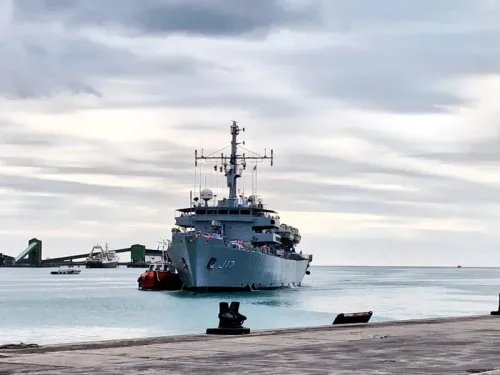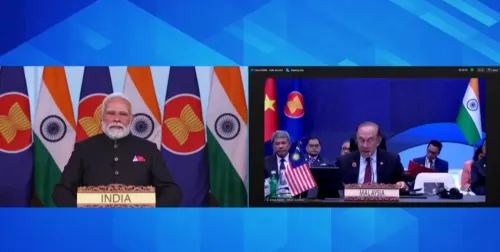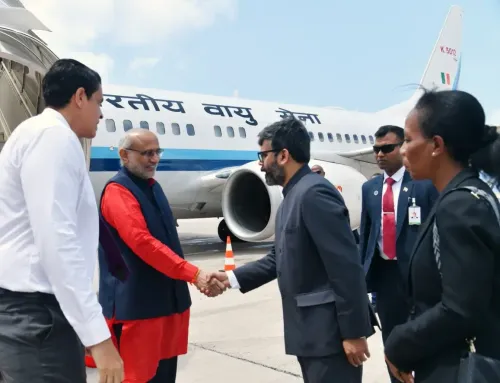Will Pak and Afghan Delegations Resolve Peace in Istanbul Talks?

Synopsis
Key Takeaways
- Delegations from Afghanistan and Pakistan are set to meet in Istanbul to discuss the Doha peace agreement.
- Ceasefire is conditional on the Taliban ceasing cross-border attacks.
- Failure to implement the agreement could escalate regional tensions.
- Concerns over terrorist groups operating near the Durand Line remain critical.
- Over 10.3 million Afghans are displaced due to ongoing conflict.
New Delhi, Oct 25 (NationPress) Delegations from Afghanistan and Pakistan are scheduled to convene in Istanbul on Saturday to assess the execution and finer points of the recently established Doha peace agreement.
These discussions, facilitated by Qatar and Türkiye, aim to bring about a ceasefire between the two nations after a series of deadly cross-border shootings that have harmed and displaced civilians near the Durand Line.
Reports indicate the talks in the Qatari capital extended for approximately 13 hours, culminating in an announcement of an agreement early on October 19.
This temporary ceasefire has offered a glimmer of hope and a reprieve for the beleaguered civilians residing near the border, following a week of sporadic but intense clashes.
Following the Doha discussions, Defence Minister Khawaja Asif, who is leading Pakistan’s delegation, underscored that the ceasefire is contingent upon the Taliban ceasing cross-border terrorist activities.
He emphasized that the sustainability of the ceasefire is dependent on this vital stipulation, positioning the Taliban's adherence as crucial for preserving peace.
In response, the Taliban asserted that it had acted in retaliation to a prior aerial assault launched by Pakistan within its borders, which included areas like Kabul.
The effective realization of the peace agreement could stabilize the prevailing tensions in the region, which are impacting trade and transit routes, including Afghanistan's access to Pakistan's ports. Conversely, failure to implement the agreement may escalate military and diplomatic strains in the South Asian landscape.
A spokesperson from Pakistan's Foreign Ministry indicated that Islamabad anticipates the establishment of a comprehensive monitoring system in Istanbul to address its security apprehensions.
He reiterated that while Pakistan does not desire an escalation, it calls upon the Afghan Taliban to address its concerns regarding alleged terror groups operating in areas adjacent to the Durand Line.
The Durand Line itself remains a contentious issue for successive regimes in Kabul, which assert that Pashtun-dominated territories across this border belong to Afghanistan or form a separate ‘Pashtunistan’.
Taliban Defence Minister Muhammad Yaqoob Mujahid, who is heading Afghanistan's delegation for the Doha negotiations, previously stated that discussions regarding the disputed border were not part of their accord with Pakistan.
During the upcoming Istanbul discussions, he merely remarked that the focus would be on the implementation of the Doha Agreement.
Khawaja Asif’s recent comments, widely circulated in the media, that the particulars of the Doha agreement will remain confidential, raise some concerns.
Nevertheless, Pakistan's Defence Minister did disclose that the agreement encompasses three critical points: the repatriation of Afghan refugees from Pakistan, the alleged sheltering of Tehreek-e-Taliban Pakistan (TTP) militants by Kabul, and the establishment of a ceasefire.
According to estimates from the United Nations, approximately 10.3 million Afghans remain displaced either within their country or in neighboring nations due to conflict, violence, and poverty.
Pakistan is currently hosting around 1.6 million Afghan refugees, with approximately 126,800 having returned over the past year. Islamabad has since compelled tens of thousands of Afghan refugees to leave.
With rampant poverty and hunger gripping the nation, alongside a lack of funding due to the absence of diplomatic recognition for the Taliban regime, Kabul is struggling to manage this influx.
Notably, Iran and Pakistan are the two principal host nations for Afghan refugees, with nearly a quarter of a million returning from the former in 2024.
Many returned during the Israeli bombardment of Iran in June. Meanwhile, Islamabad's claims of Kabul supporting terrorist activities against Pakistan have been consistently denied by the Taliban.
It is now up to the mediators to navigate the intricate relationship between these two neighboring nations, as they seek to establish lasting peace in the largest city of Türkiye.









